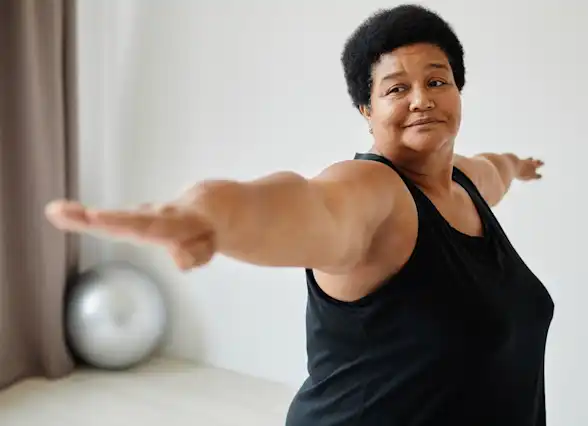Diabetes and Increased Fall Risk
Diabetes increases risk of falling because it causes physical problems that may make a person less steady on their feet.
Get insurance benefits, legal documents, and medical records in one place

Helpful Highlights
'Person(s) with diabetes' is often abbreviated PWD.
Older adults with diabetes are at significantly higher risk for falls.
They are also prone to more severe problems from falls.
Daily activity at their highest level is essential in avoiding falls.
A concerning link exists between diabetes and falls in the elderly. Research shows that older adults with diabetes have a greater risk of falls, especially those treated with insulin. One study found that persons with diabetes (PWD) aged 65 or older are 17 times more likely to fall than a younger person without diabetes.
Individuals, especially the aging population, fall because of:
decreased function in basic movements like walking and grasping
decreased function in senses like vision and hearing
problems with muscle control and strength
foot and body numbness or pain
medication complications resulting in high and low blood sugar (causing dizziness, confusion, fatigue, and weakness)
specialty footwear devices
Additionally, there is some concern that persons with diabetes (PWD) are prone to more severe problems with falls than those without diabetes, such as:
fractures
poorer rehabilitation
recurrent falls and increased number of falls
Fortunately, efforts to minimize the number and severity of falls in PWD show promise. Balance, strength, and gait training successfully reduce fall risk in this population. Furthermore, new technologies such as virtual reality proprioceptive training* may be able to reduce risk within a safe training environment.
*Proprioceptive training enhances awareness of position and movement of the body, and consequently enhances motor function and performance. This is especially valuable in PWD because of peripheral neuropathy (reduced or absent sensation in feet and lower legs and/or hands and lower arms). Exercises that improve balance also improve proprioception.
To avoid falls, the American Diabetes Association (ADA) recommends keeping active at whatever level is appropriate, focusing especially on those activities that promote balance and strength. Physical therapy can help with this, as well as pool aerobics, gentle yoga or pilates, and classes aimed at balance training for seniors. For example, SilverSneakers offers a 10-minute Better Balance Workout and a full 7-day Better Balance Challenge.
Medicare and Medicare Advantage plans offer membership in SilverSneakers, along with many other benefits aimed at diabetes health maintenance. Encourage individuals to take advantage of these benefits and other local community offerings.
RESOURCES
American Diabetes Association Schwartz, A.V., et al. (2002). Older women with diabetes have a higher risk of falls: A Prospective Study. Diabetes Care, 25(10), 1749-1754. DOI
Crews, R.T., Yalla, S.V., Fleischer, A.E., & Wu, S.C. (2013). A growing troubling triad: Diabetes, aging, and falls. Journal of Aging Research, 2013. doi: 10.1155/2013/342650
Vinik, A.I., Camacho, P., Reddy, S., Valencia, W.M., Trence, D., Matsumoto, A.M., & Morley, J.E. (2017). Aging, diabetes, and falls. Endocrine Practice, 23(9), 1117-1139. DOI: 10.4158/EP171794.RA
Yang, Y., Hu, X., Zhang, Q., & Zou, R. (2016). Diabetes mellitus and risk of falls in older adults: A systematic review and meta-analysis. Age and Ageing, 45(6), 761-767. DOI
Yee Cheng, L., Yan Leung, S., & Wa Leung, M.K. (2022). The association of glycemic control and fall risk in diabetic elderly: A cross-sectional study in Hong Kong. BMC Primary Care, 23, 192. Link
No content in this app, regardless of date, should ever be used as a substitute for direct medical advice from your doctor or other qualified clinician.
Get more support and guidance on insurance benefits, medical records and legal forms.
Helpful brings together your insurance benefits, legal documents, and medical records in one personalized place — so you always know what you have, and never have to search again.

Technology for Health Tasks. Mental Health for the Tough Stuff.
Helpful connects your medical records, insurance, and caregiving tasks automatically. And when you need more than logistics, a therapist is here to guide you.
In-Network and Covered
For Individuals, Couples and Families
HIPAA Compliant, Data Stays Private


Healthcare Tasks Simplified

From syncing records to spotting drug interactions, Helpful does the heavy lifting, turning complex health info into clear tasks and showing you benefits you can actually use, giving you clarity and control over your care.

In-Network Mental Health

Our licensed therapists are here to support you and your loved ones through stress, burnout, and life’s hardest moments, with an inclusive, compassionate approach that works with most insurance plans.

Create Legal Documents

Plan ahead by creating will, trusts, advance directives and more, that ensure your wishes are honored in the event you can’t speak for yourself -with Helpful guiding you every step of the way.